When Erik and Sonni Bornmeier purchased Sonni’s great-grandmother’s home several years ago, they had no idea that the military footlocker stored in the basement would take them on an incredible journey of discovery to find the remains of a WWII pilot shot down in France. The Bornmeiers’ used military records from Fold3, newspaper articles from Newspapers.com, numerous other sources, and some ingenious detective work to piece together the story of Sonni’s great uncle, 2nd Lt. George F. Wilson. He died in France in 1944 and to this day his remains have not been identified. Erik and Sonni are determined to bring him home. We share their journey in hopes that the tips and strategies they’ve learned along the way can help someone else in their research.
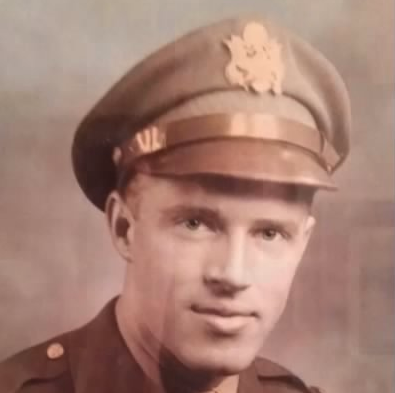
The journey to learn more about Uncle George began on Memorial Day in 2018 when the Bornmeiers’ watched Band of Brothers. Touched by the heroics of so many young soldiers, Erik and Sonni went to the basement and dusted off George’s footlocker. Inside they found a stack of letters from George to his mother. By the time they finished the last letter, they had come to know George and wanted to know what happened to him.
The first answers came when Erik found a Missing Air Crew Report (MACR) on Fold3. The MACR revealed that George served in the 8th Air Force, 398th Bomb Group, 601st Squadron. On July 8, 1944, George was piloting a B-17 when enemy flak hit the plane severely wounding George. The plane was losing altitude and George ordered his crew of eight to bail out.
Seven crew members were captured and taken POW, and one escaped with the help of the French Resistance. All eight returned home after the war and all reported that George was gravely injured, never bailed out, and went down with the plane.
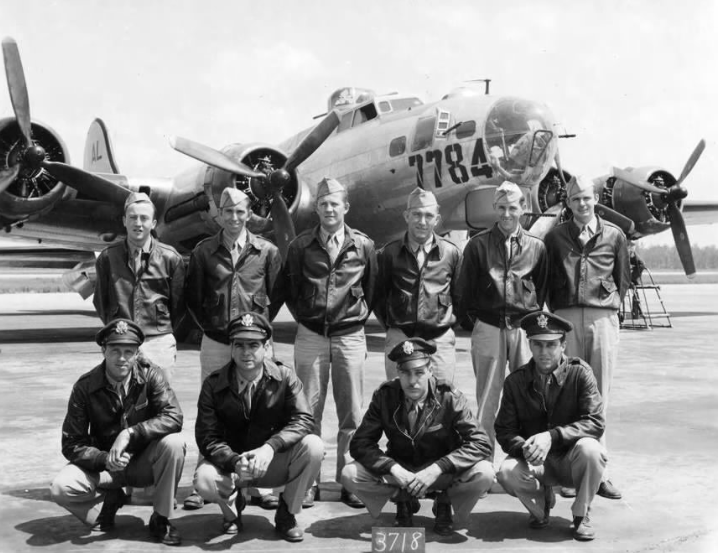
Using the witness statements from the MACR, Erik learned that the German Army created a similar report to track all planes shot down. Those reports, called Kampf Flugzeuge (KU) reports, were captured by the US military after the war. Erik also learned French priests kept detailed reports of what they witnessed during the war. Using the information in the MACR, the KU report, and a French repository, Erik triangulated potential crash sites.
One witness in the MACR described that George avoided a small town and a castle before crashing into a field. The next step for Erik was to head to France and try to find the crash site.
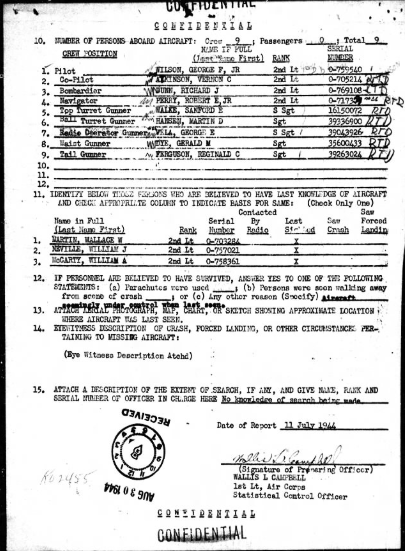
Erik’s quest led him to the small town of Monchy-Cayeux. The town matched the criteria in the witness statement (town, castle and nearby fields). Erik met a local journalist and with his help, they started questioning the town’s older residents. They found three eyewitnesses who were young children during the war but remembered seeing a plane crash. One said, “I remember it as if it were yesterday.” They guided Erik to a field and before long Erik started to find pieces of debris. Word traveled and the town united to help Erik. A young man showed up with a metal detector. Before long, they found parts of a fuselage, gauges, bullets, and plexiglass from a windshield. They found a crash site!
Erik’s time in France was short, but he has since returned several more times. Each time he pieces together more of the story. The residents of Monchy-Cayeux have rallied behind Erik and are anxious to help him find answers. Two brothers who still live close to the crash site gave a detailed account of locals gathering up weapons from the plane and throwing them in the river. A local diver explored the river but failed to find anything. Another report said George’s body was moved to a nearby family graveyard. A third witness remembered a priest coming to bless a grave on the edge of the field. The search to find George’s remains continues.
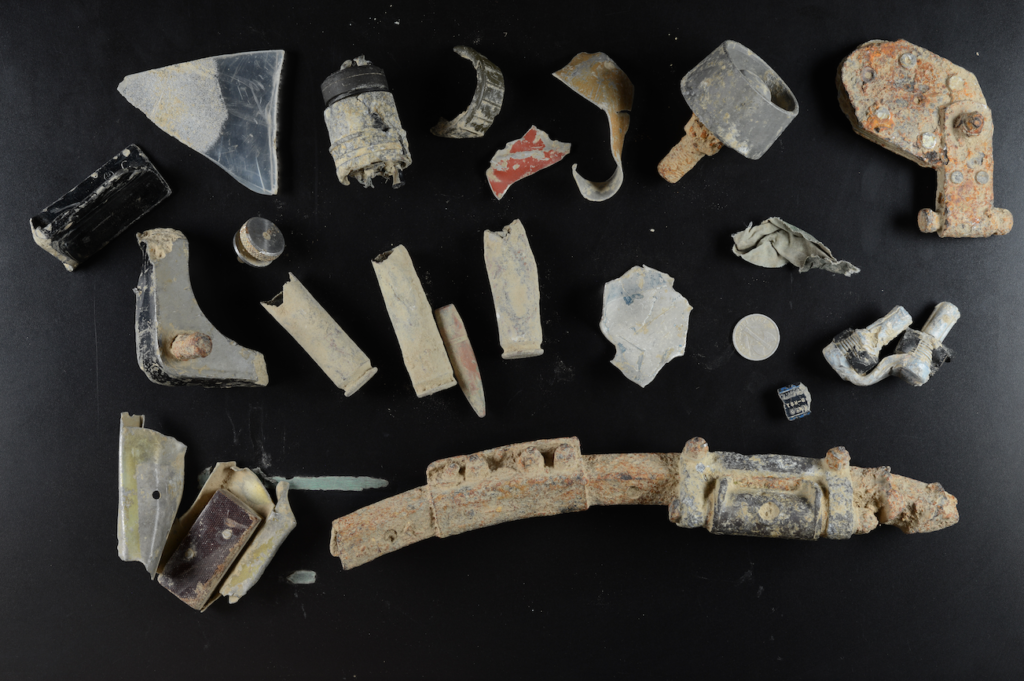
In the meantime, back home in the US, Erik and Sonni started searching Newspapers.com to find information on George’s crew. They found clippings for many of the crew members, and before long, they learned that two of George’s crew members were still alive! Erik hopped on a plane and had a wonderful meeting with them. They provided Erik with personal accounts of that day and filled in many of the gaps.
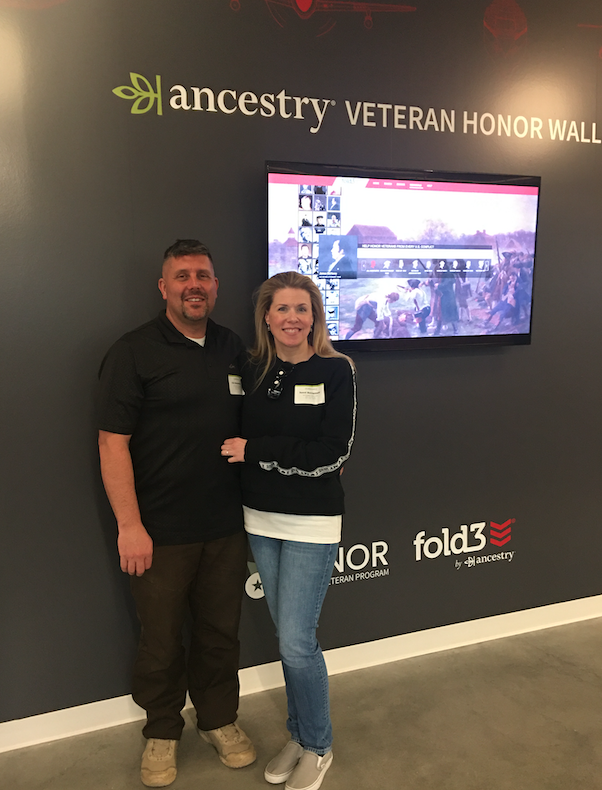
The Bornmeiers’ are working with the Defense POW/MIA Accounting Agency (DPAA), the government agency charged with bringing home the remains of Americans unaccounted for. They continue to research and are anxious to return to France. Residents of Monchy-Cayeux have taken ownership of this project and have begun holding town meetings to research the town’s history and the role it played in WWII. George is one of more than 72,000 Americans that remain unaccounted for from WWII. Each day, efforts are being made to bring those soldiers home. To learn the story of your WWII soldier, start your search today using Fold3 and Newspapers.com!


The Bornemeiers need to look into a CADAVER FINDING DOG.
https://medium.com/@groversmill/the-truth-about-cadaver-dogs-5-things-you-didnt-know-a53344a43ee7
If their relative is buried near the crash site in an unmarked grave, a good cadaver dog will be able to find the grave.
That’s exactly what I was thinking – a cadaver dog. So glad you mentioned it and I hope they’re able to do it. I used to work on a island whose history of habitation goes back thousands of years. The first battle of the War of 1812 took place on this island. Soldiers were killed and left in a field where they were later buried. The park brought in a cadaver dog and even after almost 200 years the dog was able to find the graves. So if this American hero is buried close to the field, a good cadaver dog should be able to find him so he can be brought back home.
THAT’s a GREAT idea!
Thanks for sharing this wonderful story with us all.
Never give up hope.
During WW11 my elementary teacher lost her son also a pilot in the Pacific- she kept a photo on her desk of that great pilot. I would always mention to
my teacher how fine her son looked- a big smile would come forth .
I pray that this family will find their pilot in France- we must be so honored by the brave Air Men of the 8th
Air Force.-What a great generation of men and women.
I lost my father on Sept.4TH 1941 in Ukraine. He was in the Hungarian army heavy artillery and the push was on for Stalingrad. He was 26 years old and I was 9 months old at the time.
He was buried in a mess grave in Ukraine. I get very emotional and how I wish I knew my father.
My heart goes out to you on losing your young, brave father when you were such a tiny babe. This must have been devastating to your mother❤️❤️
The Hungarian army, surely you jest?
Any Hungarians serving would have been in German units, usually special units like einsatzgruppen because it was thought they would hate the soviet more.
How rude! Probably her father was with the German Army in a Hungarian company pushing towards Stalingrad, BUT he was probably forced to join as many were in countries near Germany. Be that as it may, she lost her father and loss is loss. Be kind.
Well-said.
Yes okay point taken. Perhaps your right. She lost her father. Is it rude to comment on the underlying reasons these troops traveled thousands if kms to fight?
Germans were famous for burying their unwanted in mass graves. They used people from villages as slave soldiers. This does not mean he was a German fighter, only a lost soul forced to fight with the enemy of the world. He is still an honorable man in my eyes. Have you not learned anything from history. Child, someday you will again see the father you lost. He was a war statistic to some, but to those of us with hearts he was a hero.
I agree with Mat in that most likely he was fighting with Germans and I shudder to think what he and his unit might have been doing. Many auxiliary units were volunteer. Still we can’t condemn a man when we know anything about him as an individual and his son grieves a long lost father and how loss stole a piece of his childhood.
I love that this couple are searching for their lost relative, hoping to bring him home. I wish them all the best in their search. Even small finds bring so much to a family wanting to know more about their history and their family before them.
Such a wonderful story.
Thank you so much for sharing it with us.
There are many veterans in my family and I wish them luck in their journey to find answers to what happened to their uncle.
Great story and great people. Too bad Ancestry tries to wring more money out of us for “Fold 3” etc. etc. Greed is an ugly thing, just like war.
If the priest buried him, find the priest and you may find his records, diary, letters, who knows!?
Maybe the diocese or local parish has records, but I imagine the priest, who would be 100 years old at least, is still living.
I’m always amazed when people call Ancestry a greedy company. A company needs to make money in order to survive. For those of us who started researching in the 1970s when you were lucky if you could go to ONE repository, we value a company like Ancestry. If I go on a research trip now, I have to pay for an airline ticket, a hotel, and a rental car. I can easily spend $1,000 doing that. And yet I might only go to ONE or TWO repositories and come home with a handful of documents if I’m lucky. However, for a mere $400 a year (I have All-Access Membership) I can search for original records all over the world 24/7/365 and gets hundreds of documents for only the cost to print on my home printer.
This was a wonderful story. I wish you the best of luck for the future in finding more information. Thank you for sharing. My dad served in WWII in the Pacific. I’m so proud of him!
Well stated, I agree.
And don’t forget the French government’s old air photos of the area. In fact, if he crashed in an area that had not yet been liberated, there may be air photos in US or British archives that will show the grave. For example: https://www.geoportail.gouv.fr/donnees/photographies-aeriennes
I wish you all the best in your search for his remains. My mother’s only sibling, William Patrick Conley Jr., was a Navy flier in the Pacific theater. His plane crashed into the ocean during the battle of Okinawa. He is listed as missing in action. His body can never be recovered. My grandparents and mother would have dearly loved to have his remains found. It would have given them closure. They kept Uncle Bill’s memory alive by telling my three brothers, my sister and I all about him. I feel as if I actually met him, although we were all born after the war ended. Every trip to Hawaii includes a visit to the Punch Bowl Memorial where his name is listed on the wall.
Germans were famous for burying their unwanted in mass graves. They used people from villages as slave soldiers. This does not mean he was a German fighter, only a lost soul forced to fight with the enemy of the world. He is still an honorable man in my eyes. Have you not learned anything from history. Child, someday you will again see the father you lost. He was a war statistic to some, but to those of us with hearts he was a hero.
I am a French-English translator. I would be happy to help with your project.
Cynthia, that is very considerate of you to offer that service to them. We are looking for some French relatives and sometimes get caught up on the language. I am wondering if you would be so kind as to consider looking at our documents when we get stuck on some words? Often its the penmanship that stumps us! Carrolleigh1@gmail.com if you would like to connect.
There is a real story about a Canadian Soldier, book written by Peter Hesler.???or Helsler ??? the soldier was my sister in law’s brother. The body was recuperated 50 years later, and was replaced to its proper place. The soldier’s plane was shut down in M arch 1944, and he was captured and killed by the Germens. Good luck. It is a long way to go
To: Mat Right
My father was drafted into the Hungarian Army and sent to the Russian front. He left behind 3 young kids and my mother. Do you believe even for a second that he wanted to go to fight the Russians to help the Germans?
Hungary and Germany were allies along with the other neighboring countries. I know from my mother and grandmother that my father did not want to be in the war. He was a single family residenc builder and wanted to be home with his family.
Thank you for your reply. I’m sorry the subject matter had to be such a terrible loss to you personally.
I cannot imagine the horror a sensitive person would feel upon entering ” total wat”.
If, like you say your Dad was, you were not completely committed to the cause it would be a human crime to have to be submitted to that vile battle.
Hell, even if you were totally committed, you might get shocked and sickened into a change of heart.
So again thank you for sparking a new way to think about all the different experiences people had.
Given Hungary’s gruesome program of drafting young men to the Third Reich cause, what are your thoughts on the modern day Hungarys program of racist exclusion of refuges of war today, a stance that threatens there inclusion in the euro?
I believe a country should have the right to pick and choose who they want to have as citizens. Look what has happened in a good part of Europe due to massive immigration. It appears to becoming a massive cesspool of unemployment and crime.
Rather than apply a knee jerk derogatory epithet to the Hungarians whose position you very likely don’t appreciate, I suggest you read this very well reasoned article by a Polish academic (Poland having had the same charge leveled at it). I don’t necessarily agree with every one of his opinions and positions, but hearing the “other side” of the argument might possibly help you understand the attitudes of the people you casually label “racist.” https://www.firstthings.com/article/2020/03/why-i-am-not-a-liberal
Back in 2010, I was researching my WWII history book on Bomb Disposal Operations. Two officers had gone missing and none of my existing sources could provide any enlightenment. But a search on Fold3 (back when it was Footnote) helped me to locate a Missing Aircraft report. This document laid to rest some rumors of reckless behavior and showed how a mundane plane crash ended the lives of two Army officers. Later on, I met the cousin of one officer and I got to stand in place of the other’s family as both names were added to the U.S. EOD Memorial at Eglin AFB in Florida. I have photos of these experiences to share.
If he was buried there…..they might just find that he is still wearing his dog tags….around his neck ( bones). The tags would not deteriorate over 75 yrs. I wish them good luck in returning his remains home.
I have found out that at least three of my ancestors where in the service and one two were in the war of 1812, The American Revolution, WWll and my own dad in The Air National Guard for 22 years. Wondering if someone could find more more info. Would like pictures or anything you can find. Two of my family members are in the book of the Daughters of the American Revelation and one in the Son’s of the the American Revolution. Thank you so much, hope you can help me! Mrs K Wilson
This brings tears to my eyes as my uncle, Lt Bill Boyd is the Lt George Wilson of our family. Bill was the pilot on the Screwball flying out of England on 8 missions. The 8th one was the last August 6, 1944. They were hit by flack outside Berlin. Bill stayed with the plane and either died before or after the plane crashed. His body was brought back to FT Sam Houston for burial in 1949. I was 5 years old but I have a memory of going there from Waco, TX.
I don’t know the correct name but there’s a website where you can find information on all who flew on the flights. My cousin from St Louis met with several of the survivors years ago.
Blessings as you continue your search.